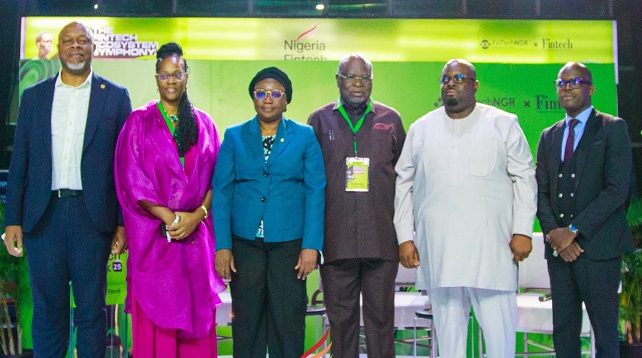E-Financial
NSE Reviews Rules on Pricing Methodology

The Nigerian Stock Exchange (NSE) has announced the amendment to the rules on Pricing Methodology; price movements of equity securities traded on The Exchange.
The amendments, which will be effective on Friday, October 11, 2019, are to Rules 15:29.2. C.2 of the Rulebook of the Exchange, 2015 (Dealing Members’ Rules). Specifically, the amendments relate to the minimum trade quantity required to change prices for equity securities traded on The Exchange.
With this review, the minimum trade quantity required to change prices for equity securities traded on The Exchange will henceforth be one hundred thousand (100,000) units for all securities groups.
This implies that trades of fewer than One Hundred Thousand (100,000) shares in any of the groups are small trades. Small trades in an equity security will not result in a change in the publicly reported price of such security.
The revised pricing methodology is expected to ensure overall market stability and efficiency and fairness in pricing NSE securities.
On January 29, 2018, The Exchange implemented amendments to its pricing methodology and par value rules that saw the categorization of quoted companies under three groups with different pricing rules.
Group A consists of large-cap equities that are priced at N100 per share or above for at least four of the last six trading months, or new security listings that are priced at N100 or above at the time of listing on the Exchange.
The second category, Group B, consists of medium-priced equities that are priced at N5 per share or above but less than N100 per share for at least four of the last six months, or new security listings that are priced at N5 per share or above but less than N100 per share at the time of listing on the Exchange.
The third category, Group C, consists of equities that are priced at one kobo per share or above but below N5 per share for at least four of the last six months, or new security listings that are priced at one kobo per share or above but below N5 per share at the time of listing on the Exchange.
Hitherto, the prices of securities would only change if the volume of a trade was at a threshold of 10,000 for securities in Group A, 50,000 for securities in Group B and 100,00 for securities in Group C.
Speaking on the amendment, Mr. Oscar N. Onyema, CEO, noted that, “The Exchange remains committed to maintaining a platform that engenders a fair and efficient market. This change is born out of the need to ensure that all price improving (up/down) transactions are material, making the market more efficient and attractive.
“We will continue to review our rules and rule-making processes to boost investor confidence in our market while ensuring that NSE rules comply with international best practice.”
E-Financial
CBN Makes case for Open Banking Policy @ Nigeria Fintech Week

Mr. Olayemi Cardoso, Governor of the Central Bank of Nigeria, CBN, has said that policies such as open banking when operational will foster new opportunities for collaboration, ensuring customers benefit from competitive, tailored services by balancing innovation.

Open banking is a system that allows customers to securely share their financial data with authorized third-party providers (TPPs) through APIs (Application Programming Interfaces), enabling them to access innovative financial products and services like consolidated account dashboards, personal finance management tools, and more convenient payment methods.
Mr. Cardoso, disclosed this while speaking during the opening ceremony of the Nigeria Fintech Week 2025 in Lagos.
Cardoso, who was represented by Opemi Yusuf, the Director of Payment System Supervision at the apex bank, said that as Nigerian advances towards a cashless economy, the foundation of progress must remain trust in our payment system. Innovation loses its meaning if consumers are not confident in the safety of their money or the protection of their data.
“Initiatives such as Agent banking and microfinance expansion targets the grassroots community solution like mobile wallets and USSD services lowering barriers, but technology alone cannot close it, we must combine innovation with collaboration across government, industry and communities to build trust, improve literacy and extend financial services to rural and underserved areas. Our collective commitment must be that no regional community is left out of the Digital transformation”.
“Over the last year, we have seen strong adoption of digital channels with total electronic payments reaching over 3.9 billion transactions valued at N280 trillion in August 2024 compared to the growth of 4.12 billion transactions valued at N384 trillion by July 2025,” he stated.
The CBN Governor added that the apex bank continues to work closely with the Nigeria Electronic Fraud Forum and law enforcement agencies to combat digital crime and protect consumers.
“By balancing innovation with prudent oversight, we allow new technologies to flourish while protecting consumers and the broader financial system. A symphony is incomplete if some instruments are silent,” he said in reference to the theme of the forum.
In his opening address at the event, President of the Fintech Association of Nigeria (FintechNGR), Dr. Stanley Jacob, described this year’s theme, “The FinTech Ecosystem Symphony: Orchestrating Nigeria’s Digital Future”, — as a call to collective action.
“This is not merely an event; it has become a statement of intent,” Jacob said, urging participants to seize the opportunity to forge partnerships and make impactful deals that will shape the sector’s future.
Also speaking, Vice President of the Association and Chair of the 2025 NFW, Dr Jameelah Sharrief-Ayedun, noted that for the first time, besides having diverse sector participation, the NFW is happening concurrently in more than one city.
According to her, beyond Lagos, the event is also holding in Abuja, Delta and Enugu at the same time.
E-Financial
AfDB to Lend Nigeria $500m in Fresh Budget Support

African Development Bank (AfDB) has announced plans to extend a $500m loan to Nigeria this year as part of a $1bn budget support programme, citing the country’s ongoing economic reforms under President Bola Tinubu as a major factor driving its decision.

Bode Oyetunde, executive director representing Nigeria and São Tomé and Príncipe on the AfDB Board, disclosed this on Monday during the Nigerian Economic Summit in Abuja.
He said the facility, which is subject to board approval, could be finalized before the end of the year.
According to Oyetunde, the bank is providing the funding in recognition of Nigeria’s “bold and aggressive macroeconomic reforms” since President Tinubu assumed office in May 2023.
He noted that the AfDB intends to sustain its support for the country’s fiscal consolidation and structural transformation agenda.
“We have been working strongly to support Nigeria’s very bold and aggressive macroeconomic reforms under President Tinubu. Given all these reforms, it was important to support Nigeria,” Oyetunde told Reuters on the sidelines of the summit.
“They asked us for $1.5bn. We are able to do $1bn over two years. Last year, we provided $500m in budget support. This year, we are looking to do another $500m, subject to board approval.”
The $500m loan represents the second tranche of a two-year, $1bn budget support initiative designed to bolster Nigeria’s fiscal resilience and accelerate policy reforms in key economic sectors. The first tranche, amounting to $500m, was disbursed in 2024.
Since President Tinubu took office, Nigeria has implemented a series of sweeping economic measures, including the removal of long-standing fuel subsidies, unification of the foreign exchange market, and the introduction of comprehensive tax reforms.
These steps aim to stabilize public finances, attract foreign investment, and restore confidence in the nation’s economy.
Oyetunde further explained that the AfDB’s engagement is focused on supporting Nigeria’s fiscal discipline and power sector reforms, two critical areas that underpin sustainable growth and job creation.
The power sector, in particular, has remained a key priority for the AfDB’s intervention in West Africa, given its centrality to industrial productivity and private sector expansion.
The multilateral lender’s endorsement comes amid renewed investor interest in Nigeria’s reform programme, with global financial institutions acknowledging the government’s efforts to address long-standing structural bottlenecks.
The latest support from the AfDB is expected to ease fiscal pressures on the federal government, strengthen its reform implementation capacity, and provide much-needed liquidity for developmental programmes in the medium term.
E-Financial
Reps Plan to Regulate Cryptocurrency, PoS Operations

House of Representatives has constituted an Ad-hoc Committee to examine the regulatory and security implications of cryptocurrency adoption and Point-of-Sale (PoS) operations across Nigeria.

Tajudeen Abbas, speaker of the House, announced the formation of the committee during an inauguration ceremony on Monday, saying the move became necessary following increasing reports of fraud, cybercrime, and consumer exploitation within the digital finance ecosystem.
Abbas said the House was worried about the rising number of scams linked to unregulated PoS and crypto transactions, stressing that Nigeria’s digital financial space had become a breeding ground for fraudulent practices due to weak oversight mechanisms.
“It is because of the absence of clear rules, coupled with the volatility and complexity of the technology, that the House of Representatives found it imperative to establish regulations and consumer protection measures,” the Speaker said.
He explained that the proposed framework would help close existing loopholes and protect citizens from exploitation by Virtual Asset Service Providers (VASPs), including cryptocurrency operators and other digital finance platforms.
According to Abbas, the ad-hoc committee’s primary assignment will include conducting public hearings and gathering submissions from key stakeholders such as the Central Bank of Nigeria (CBN), fintech companies, cybersecurity experts, and consumer rights organisations.
“The committee is necessary to undertake public hearings to collate relevant information that will guide the House in developing legislation for a regulatory framework for the adoption of cryptocurrency and virtual assets in our economy,” he added.

 Telecom2 days ago
Telecom2 days agoAkwa Ibom, T2 Set to Drive Digital Transformation

 E-Business2 days ago
E-Business2 days agoKaspersky, Partners Launch a Career Orientation Test to Inspire more Girls into Cybersecurity

 E-Financial2 days ago
E-Financial2 days agoAfDB to Lend Nigeria $500m in Fresh Budget Support

 Telecom2 days ago
Telecom2 days agontel Gets Fresh Capital Injection for 2026 Relaunch

 E-Financial2 days ago
E-Financial2 days agoCBN Releases New Guidelines, Caps POS Agent Daily Transactions at N1.2m

 Telecom1 day ago
Telecom1 day agoChronicles Software unveils free SuccessBOX.ng platform for SS3 students, announces ₦10m reward scheme

 E-Financial2 days ago
E-Financial2 days agoFidelity Bank Hosts Black-Tie Gala Honouring Afreximbank President Prof. Benedict Oramah

 E-Financial2 days ago
E-Financial2 days agoReps Plan to Regulate Cryptocurrency, PoS Operations

























